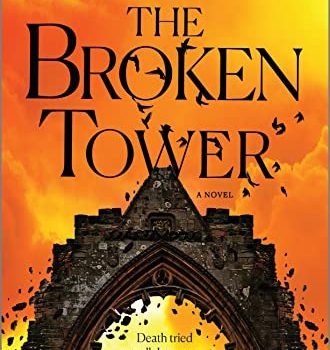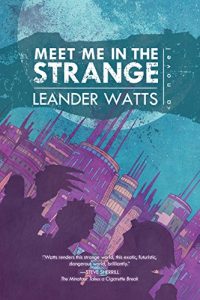Maya C. James Reviews The Broken Tower by Kelly Braffet
 The Broken Tower, Kelly Braffet (Mira Books 978-0-77833-179-7, $27.99, 480pp, hc) Cover by Micaela Alcaino.
The Broken Tower, Kelly Braffet (Mira Books 978-0-77833-179-7, $27.99, 480pp, hc) Cover by Micaela Alcaino.
Content-warning: mentions of self-harm, child abuse.
Kelly Braffet’s The Broken Tower picks up right after the The Unwilling, where Judah the Foundling jumps from the top of a castle tower to save her stepbrother, Gavin. Following her leap of faith, she finds herself in the company of two mysterious men, and her magical connection with Gavin has become fragile. Not knowing if he’s alive, or where she is, she embarks on a journey to rescue him and avoid those who seek her powers. Her freedom from Highfall comes at a price, though: other dangerous powers lurk outside the Great Wall, and she must master the power that has put her in danger if she’s to save her stepbrother.
The second novel in The Barrier Lands series, The Broken Tower is a dark and twisted story of corruption, empathy, and chosen family. Braffet begins with a few brutal scenes to demonstrate the level of corruption and betrayal present in this world. The adults are unusually cruel, often looking for ways to exploit children for profit, regardless of the line of work they may do. This casual violence does not go unnoticed, and Braffet makes it obvious that the villains are the corrupt officials that profit from such cruelty. It’s not surprising to see that most of the children in this novel are deeply scarred in one form or another, sometimes physically, sometimes emotionally, but most often both. However, there is some hope, no matter how fleeting. The characters are quite young but clever enough to keep themselves (and their humanity) intact despite those conspiring to destroy every part of them.
For example, Judah and Gavin typically communicate with one another by cutting messages into their arms, but after Judah jumps from her tower in the first book, she’s left with no memories of those scars. In a compelling scene, she realizes that she feels incomplete without these memories, even if she has been freed from the pain of them. Whenever Gavin feels pain, she feels pain as well.
I enjoyed reading Judah’s growth from her traumatic, near-death moment of the first book. She is still coming to terms with the way she has been maneuvered and used by powerful officials but is not so bitter to forget the love she has for her foster brother. It was also quite disturbing to read of bloodletting and sharing. Not because the violence did not have a place in the world, but because it seemed to border on excessive trauma just for the sake of plot tension. Magic is no pretty thing in this world, either – it’s a transactional give and take, where harm often comes to the others involved in the process. However, Braffet still made excellent use of other forms of tension: longing for family, acts of desperation, faith and zealotry, and characters who never seem to tell the truth.
Speaking of zealotry, there is some amount of mass hysteria and delusion as well – there’s a mysterious thing called the Unbinding, which I can’t give too much detail about, but seems to bring out the worst in humans. Judah is unfortunately intimately acquainted with the fanatical symptoms her presence seems to bring. It is rare that any of the characters are triumphant, or are not being abused. Perhaps this will change in future books in the series, but a recurring theme seems to be self-determination even in the worst of circumstances.
I found the characters are very realistic, which can prove a daunting task when surrounded by a world filled with magical intrigue and an onslaught of non-stop abuse. Many of them just want to survive, and are put in compromising and vulnerable positions. With some exceptions, the protagonists and unlikely heroes are the most compelling characters in the novel – it’s unclear what drives some of the villains, but that lack of clear motivation does not reduce the enjoyment of reading the book. There’s plenty of action, betrayal, and internal growth from the large cast of characters to keep one’s attention.
I do not recommend reading The Broken Tower without reading The Unwilling first. While Braffet provides a summary of the first book’s events, anyone who may not have read it may find themselves quickly lost. That’s not to say The Broken Tower isn’t worth reading, but it’s a true epic fantasy novel and cannot be readily caught up with in a matter of a few pages. There are numerous characters, some of who have multiple names, most of who are lying about their names and origins. It’s certainly not light or easy reading, and deserves a focused read.
The Broken Tower is a tale that grips readers by the shoulders and demands answers to impossible questions.
Maya C. James is a graduate of the Lannan Fellows Program at Georgetown University, and full-time student at Harvard Divinity School. Her work has appeared in Star*Line, Strange Horizons, FIYAH, Soar: For Harriet, and Georgetown University’s Berkley Center Blog, among others. She was recently long listed for the Stockholm Writers Festival First Pages Prize (2019), and featured on a feminist speculative poetry panel at the 2019 CD Wright Women Writer’s Conference. Her work focuses primarily on Afrofuturism, and imagining sustainable futures for at-risk communities. You can find more of her work here, and follow her on Twitter: @mayawritesgood.
This review and more like it in the March 2022 issue of Locus.
 While you are here, please take a moment to support Locus with a one-time or recurring donation. We rely on reader donations to keep the magazine and site going, and would like to keep the site paywall free, but WE NEED YOUR FINANCIAL SUPPORT to continue quality coverage of the science fiction and fantasy field.
While you are here, please take a moment to support Locus with a one-time or recurring donation. We rely on reader donations to keep the magazine and site going, and would like to keep the site paywall free, but WE NEED YOUR FINANCIAL SUPPORT to continue quality coverage of the science fiction and fantasy field.
©Locus Magazine. Copyrighted material may not be republished without permission of LSFF.








